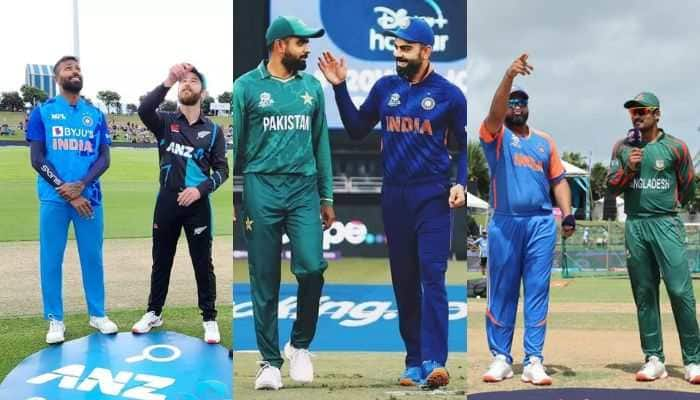Armenia-Azerbaijan war: New clashes strain Nagorno-Karabakh ceasefire, know what happened so far
Russia, which brokered the ceasefire, appealed for both sides to respect it and Luxembourg reiterated European Union calls for Turkey, an ally of Azerbaijan, to do more to secure an end to hostilities that have killed hundreds of people.
- Azerbaijan and ethnic Armenian forces accused each other on Monday of launching new attacks in and around Nagorno-Karabakh.
- This increased the strains on a two-day-old humanitarian ceasefire intended to end heavy fighting over the mountain enclave.
- Russia has brokered the ceasefire and appealed for both sides to respect it.
Trending Photos
Azerbaijan and ethnic Armenian forces accused each other on Monday of launching new attacks in and around Nagorno-Karabakh, increasing strains on a two-day-old humanitarian ceasefire intended to end heavy fighting over the mountain enclave. Russia, which brokered the ceasefire, appealed for both sides to respect it and Luxembourg reiterated European Union calls for Turkey, an ally of Azerbaijan, to do more to secure an end to hostilities that have killed hundreds of people.
The fighting, the deadliest over Nagorno-Karabakh in over 25 years, is being watched closely abroad partly because of the proximity of the fighting to Azeri gas and oil pipelines and the risk of regional powers Turkey and Russia being dragged in. Both Ankara and Moscow are under growing pressure to use their influence in the region to end the fighting.
On Monday, Azerbaijan`s defence ministry said Armenian forces had tried to attack its positions around the Aghdere-Aghdam and Fizuli-Jabrail regions and were shelling territories in the Goranboy, Terter and Aghdam regions inside Azerbaijan. Kremlin spokesman Dmitry Peskov said Russia, which has a defence pact with Armenia, was monitoring the events and asked Azeri and ethnic Armenian forces to respect the ceasefire.
The humanitarian ceasefire is meant to allow ethnic Armenian forces and Azerbaijan to swap prisoners and bodies of people killed in two weeks of fighting over Nagorno-Karabakh, which is internationally recognised as part of Azerbaijan but governed and populated by ethnic Armenians. But the ceasefire has frayed quickly. Azerbaijan said on Sunday it launched airstrikes against an Armenian regiment, following what it said was an Armenian rocket attack on an apartment building. Armenia denied carrying out such an attack.
APPEALS TO TURKEY: Zohrab Mnatsakanyan, Armenia`s foreign minister, met Russian Foreign Minister Sergei Lavrov in Moscow. He accused Azerbaijan of acting to expand Turkey`s influence in the region and of using pro-Turkish mercenaries - charges Ankara has denied.
Accusing Azerbaijan of ceasefire violations, Mnatsakanyan said: "We want the ceasefire, we want verification mechanisms on the ground, which will indicate the perpetrator, which will demonstrate the party, which is not faithful to this ceasefire." Speaking before a meeting of EU foreign ministers in Berlin, Luxembourg`s foreign minister, Jean Asselborn, urged Turkey to do more to end the latest flare-up of the decades-old conflict.
"Turkey has not called for a truce yet, and I believe they are completely wrong with this position," Asselborn said. "I think the message from Luxembourg will be a call on Turkey, a NATO member, to help arrange a ceasefire quickly."
Azeri President Ilham Aliyev repeated calls for Turkey, which has voiced strong support for Azerbaijan since the fighting began, to be involved in peacemaking. Mediation has for years been led by France, Russia and the United States. "Even if many Western countries do not want to accept it, Turkey`s word is big, it`s fully independent," he said.
WHERE AND WHAT IS NAGORNO-KARABAKH? It`s a mountainous, forested patch of land that sits inside the territory of ex-Soviet Azerbaijan and is recognised under international law as part of that country. But the ethnic Armenians who make up the vast majority of the estimated 150,000 population reject Azeri rule. They have been running their own affairs, with support from Armenia, since Azerbaijan`s troops were pushed out in a war in the 1990s. A ceasefire was agreed in 1994 but at least 200 people were killed in a violent flare-up in 2016. Nagorno-Karabakh survives almost totally on budget support from Armenia and donations from the worldwide Armenian diaspora.
WHY HAS FIGHTING BROKEN OUT NOW? Tensions between the two sides have been building over the summer, and spilled into direct clashes on Sept. 27. The timing is significant because the outside powers that have mediated in the past - namely Russia, France and the United States - are distracted by the COVID-19 pandemic, the upcoming U.S. presidential election and a list of world crises from Lebanon to Belarus. Lower-level clashes in July prompted only a muted international response. Turkey, which held large military exercises with Azerbaijan in July and August, has been even more conspicuous in its support compared with past crises. Turkish President Tayyip Erdogan has said Ankara will stand by Azerbaijan "with all its resources and heart".
WHAT ARE THE RISKS? Past outbreaks of fighting have killed some 30,000 people since 1988. Military and political analysts say they have witnessed an increase in deployment of heavy weaponry such as rockets and artillery, bringing a higher risk of civilian casualties that would make it harder to pull the two sides back from all-out war. That in turn could draw in other powers such as Turkey and Russia and destabilise the South Caucasus region, an important corridor for pipelines carrying oil and gas.
WHAT COULD STOP THE FIGHTING? Russia potentially holds the key: it has a mutual defence pact with Armenia and a military base there, but also enjoys good relations with Azerbaijan and has no interest in the conflict spreading. Moscow brokered a humanitarian ceasefire that went into effect on Saturday though it quickly came under strain. If its diplomacy succeeds, Moscow could earn kudos for ending the fighting at a time when it is under intense criticism on other fronts, including over its backing for Belarus President Alexander Lukashenko after a disputed election and over the poisoning of Russian opposition politician Alexei Navalny in Siberia, which Germany says was carried out with a nerve agent.
The renewed fighting is the worst since a 1994 ceasefire ended a war over Nagorno-Karabakh that killed at least 30,000. Azerbaijan said 41 Azeri civilians had been killed and 207 wounded in the fighting since Sept. 27. Azerbaijan has not disclosed information about military casualties. Nagorno-Karabakh has said 429 of its servicemen and more than 20 civilians have been killed in the fighting.
with Reuters inputs
Stay informed on all the latest news, real-time breaking news updates, and follow all the important headlines in india news and world News on Zee News.
Live Tv







)
)
)
)
)
)
)
)
)
)
